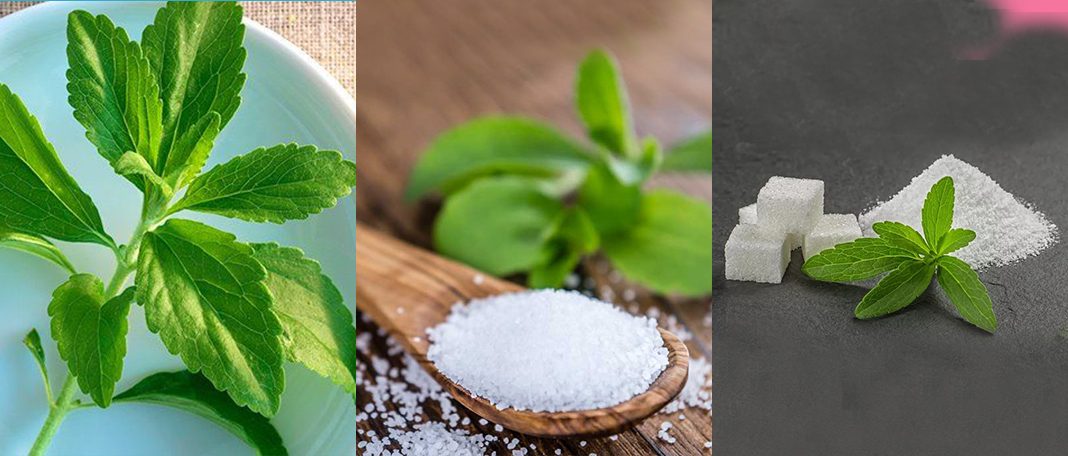Stevia:
Stevia is a natural sweetener derived from the leaves of the Stevia rebaudiana plant, which is native to South America. It is a popular sugar substitute known for its intense sweetness without adding calories or raising blood sugar levels, making it an appealing option for individuals looking to reduce their sugar intake or manage diabetes.
Key points about Stevia:
- Intense Sweetness: Stevia’s sweetness comes from its natural compounds called steviol glycosides. It is about 200 to 300 times sweeter than sugar, so only a small amount is needed to achieve the desired sweetness in recipes or beverages.
- Zero Calories: Unlike sugar, Stevia contains virtually no calories, making it a favorite sweetener for those seeking to reduce their calorie intake or manage their weight.
- Non-Glycemic: Stevia does not significantly impact blood sugar levels, making it a safe sugar substitute for individuals with diabetes or those concerned about blood sugar control.
- No Carbohydrates: Stevia does not contain carbohydrates, making it a suitable sweetener for low-carb and keto diets.
- Safe for Most People: Stevia is generally considered safe when consumed in moderate amounts. Health organizations like the U.S. Food and Drug Administration (FDA) and the European Food Safety Authority (EFSA) have approved high-purity steviol glycosides as a food additive.
- Different Forms: Stevia is available in various forms, including liquid drops, powder, and granules. Some products may contain additional ingredients, so it’s essential to check labels for purity and additives.
- Taste Profile: Stevia can have a slightly bitter or licorice-like aftertaste, which some people may find off-putting. Different brands and products may have varying levels of aftertaste.
- Uses: Stevia can be used in cooking, baking, and sweetening beverages like tea or coffee. It’s important to note that it does not provide the same volume and texture as sugar in some baked goods, so recipes may need to be adjusted accordingly.
Benefits of Stevia
One commonly known benefit of Stevia is its low calories and tendency to lower blood pressure.
Weight-loss – If you are a person looking to reduce weight and watch what you eat, Stevia is a good option to include in your diet. Stevia when mixed with food gives the feeling of fullness within a few intakes. This means less calorie intake and more weight loss.
Studies have shown that consuming stevia for longer periods of time decreased low-density lipoprotein (LDL or bad cholesterol) and total cholesterol with no negative side effects. Consuming stevia for shorter periods of time may not deliver the same results.
Diabetes- Stevia is proven to lower blood pressure. This aspect of it particularly helps diabetes patients who are advised to monitor their blood pressure. Studies found that stevia significantly lowered insulin and glucose levels. This indicates stevia is a safe and effective way to help manage blood sugar levels, especially in people with type 2 diabetes.
Cavity prevention – Commonly called novel sweeteners, nonnutritive sweeteners, Stevia products are found to not cause tooth decay. Normal sweeteners aid bacteria growth inside the tooth but the almost zero-calorie nature of stevia doesn’t provide nutrients for bacteria to feed on. This means stevia won’t cause cavities and might even prevent gum-related diseases like gingivitis.
Risk Factors of Stevia
Carb count – All the above-mentioned benefits of Stevia can be considered their risks too. Stevia and its processed by-products such as sugars and liquid sweeteners are known for having almost no calories. But research has found that Stevia sugar components contain glucose and starch which will impact carb count. Therefore, having too much stevia may also increase weight.
Intolerance – Studies have linked nonnutritive sweetener usage to inducing glucose intolerance and metabolic disorders. Stevia products made with sugar alcohols are found to cause digestive problems, such as bloating and diarrhea.
Other risks – There is widespread concern that ‘raw stevia herb’ may harm your kidneys, reproductive system, and cardiovascular system. The herb also aids in rapidly reducing blood pressure and interacting with medications that do the same.
TAKE AWAY
Stevia is good when consumed in small amounts. Research is still ongoing about its benefits and risks. Kindly consult your doctor before making major dietary changes.
















